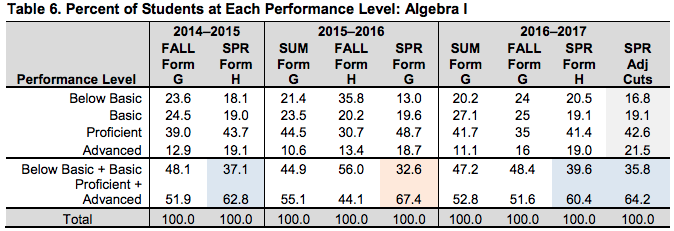Sunshine in the Show-Me State: 2017 EOC Scores Released
The Missouri Department of Elementary and Secondary Education (DESE) has, after months of delays, finally responded to CEAM’s Freedom of Information Request for more details regarding DESE’s decision to not release or use the scores from the Algebra 1 and English 2 End OF Course (EOC) exams from the 2016-17 school year.
In late August, DESE announced that the state would NOT be releasing the results of the EOCs nor use those scores for school or district APR scores (although they would use those scores to determine final grades and A+ scholarship eligibility for over 60,000 students).
DESE claimed there were issues with the test design that would make it impossible to use the tests for year-to-year comparability.
DESE’s response to CEAM’s FOIA request includes 188 emails with some details on the process involved in crafting a message about the decision to not release the scores, notes from four Technical Advisory Committee (TAC) meetings, a listing of the members of the TAC as well as compensation levels, and the actual scores from the two EOC exams. All released documents can be downloaded here.
DESE has consistently said that this year’s EOC scores are not comparable to previous years and noted in one of the released emails that “it would be irresponsible to publicly report data obtained by DESE in its current form.”
CEAM believes that families have a right to know how their school (or schools they may be considering enrolling their children in) performed on the exams and this information is critical to true school accountability.
We are still processing all of the data released, but we wanted to make sure that families throughout the state had access to the test data immediately so they can see how their individual schools and districts performed. A spreadsheet for the entire state is included in the link above, but we have created easily searchable databases for district and building level scores below.
District level EOC scores
Building level EOC scores
More details on decision to not release scores
The TAC began discussing issues with the EOC exams in early June, initially focusing on three issues that arose in the administration of the exams — bandwidth limitations, software malfunctions, and system timeouts.
In late July, the TAC discussed how the state should deal with the Algebra 1 and English 2 EOC scores after learning that those two tests showed a “substantial drop in the percent of students found to be proficient or above from 2016 to 2017.”
According to the meeting minutes:
In Algebra I, the percent proficient or above in the spring of 2016 was 7 percentage points higher than in spring of 2017. Similarly, for English II, the percent proficient or above in the spring of 2016 was 9.5 percentage points higher than in spring of 2017. For the other six subjects, the change from 2016 to 2017 for spring assessments varied from a 1 percentage point increase to a 3.4 percentage point drop.
The TAC was informed that different tests were used in 2017 and 2016, but that the same test was used in 2017 and 2015 and that there was a small drop in performance between 2015 and 2017. Given the change in tests, the TAC concluded that some adjustment in how the scores were reported was warranted to ensure fairness to schools, recommending in July that the score level used to determine proficiency on the exam be changed.
That decision was reversed in August when the TAC was joined by DESE Commissioner Margie Vandeven and the group learned that even with the recommended adjustments there would still be a drop in proficiency between 2016 and 2017:
 After considering six different options the TAC eventually agreed to exclude the 2017 results from accountability considerations and not report them to the public.
After considering six different options the TAC eventually agreed to exclude the 2017 results from accountability considerations and not report them to the public.
TAC members identified
While the members of the TAC are not listed on the DESE website, CEAM’s Freedom of Information Act request obtained both the names and compensation agreements for the existing board. Committee members are expected to meet four times a year with an honorarium of $2,500 per day. Members are also reimbursed for travel expenses and receive $325 per hour if a conference call or web-based meeting is required.
The TAC is composed of:
- Bertha Doar, director of assessment, St. Louis Public Schools
- Karla Egan, independent consultant
- Ron Mertz, St. Louis Public Schools, retired
- Andy Porter, chair of TAC, University of Pennsylvania
- Ed Roeber, independent consultant
- Barbara Plake, University of Nebraska, retired
- Phoebe Winter, independent consultant
« Previous Post: Metro districts get mixed APR results
» Next Post: BOE: School Choice Works